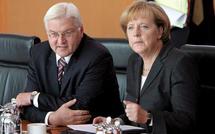
A "blitz poll" released by ZDF television immediately after the debate showed that 55 percent of people still wanted Merkel as chancellor, with only 38 percent preferring her opponent.
A separate survey, by the Forsa Institute for RTL showed 58 percent believing Merkel was "better suited to lead the country" with 28 percent thinking Steinmeier.
Both candidates dressed in black business suits and the debate descended into an equally colourless discussion of policies, prompting one of the four moderators to quip at one point: "This is not a duel, this is a duet."
"You two are like an old married couple," said another one of the journalists asking the questions, who tried in vain to turn up the heat at the exchange.
In fact, both candidates praised the work of the grand coalition that has been in power for the past four years, with Steinmeier saying, "we have achieved a lot together" and Merkel agreeing they had "worked well together."
But Merkel said she could return Europe's biggest economy to prosperity if she could link up with her partner of choice, the pro-business Free Democrats.
"We can continue decisively on this path but preferably with a new government," she said.
For his part, asked why he did not think Merkel should be chancellor for the next four years, Steinmeier said: "Because there is a better alternative, namely me."
Nevertheless, they did lock horns over some key issues during the 90-minute debate, mainly nuclear energy and wage policy.
Merkel's Social Democratic predecessor Gerhard Schroeder agreed to mothball the country's reactors by about 2020.
But the chancellor said Sunday that Germany's nuclear power plants should stay open as a "bridge technology until renewable, affordable energy makes a transition possible."
But Steinmeier called nuclear energy dangerous.
"That is the wrong way to go," he said of Merkel's plan. "We must maintain the phase-out of nuclear power."
Both tried to claim credit for the recent state-brokered rescue of carmaker Opel and lower unemployment during the grand coalition.
Opposition parties immediately attacked the TV debate. Dietmar Bartsch from the far-left Linke party dismissed the duel as "a boring night ... there was no real conflict."
Political scientist Karl-Rudolf Korte told ZDF television that Steinmeier was surprisingly impressive during the debate -- "more spontaneous, slightly fresher and spoke in shorter sentences that one might have expected".
She was stronger on crisis management, he was stronger on social justice, Korte added.
"Both had their strong points," he added.
Polls before the debate showed more than half of people thought the TV debate would influence their vote on September 27, but the situation appeared to have changed in the immediate aftermath of the "duel", as the debate was dubbed.
Only 14 percent said the debate would influence how they would vote, compared to 84 percent who said it would have no effect, according to the Forsa survey.
------------------------------------------------------------------------------------------------------------------------
A separate survey, by the Forsa Institute for RTL showed 58 percent believing Merkel was "better suited to lead the country" with 28 percent thinking Steinmeier.
Both candidates dressed in black business suits and the debate descended into an equally colourless discussion of policies, prompting one of the four moderators to quip at one point: "This is not a duel, this is a duet."
"You two are like an old married couple," said another one of the journalists asking the questions, who tried in vain to turn up the heat at the exchange.
In fact, both candidates praised the work of the grand coalition that has been in power for the past four years, with Steinmeier saying, "we have achieved a lot together" and Merkel agreeing they had "worked well together."
But Merkel said she could return Europe's biggest economy to prosperity if she could link up with her partner of choice, the pro-business Free Democrats.
"We can continue decisively on this path but preferably with a new government," she said.
For his part, asked why he did not think Merkel should be chancellor for the next four years, Steinmeier said: "Because there is a better alternative, namely me."
Nevertheless, they did lock horns over some key issues during the 90-minute debate, mainly nuclear energy and wage policy.
Merkel's Social Democratic predecessor Gerhard Schroeder agreed to mothball the country's reactors by about 2020.
But the chancellor said Sunday that Germany's nuclear power plants should stay open as a "bridge technology until renewable, affordable energy makes a transition possible."
But Steinmeier called nuclear energy dangerous.
"That is the wrong way to go," he said of Merkel's plan. "We must maintain the phase-out of nuclear power."
Both tried to claim credit for the recent state-brokered rescue of carmaker Opel and lower unemployment during the grand coalition.
Opposition parties immediately attacked the TV debate. Dietmar Bartsch from the far-left Linke party dismissed the duel as "a boring night ... there was no real conflict."
Political scientist Karl-Rudolf Korte told ZDF television that Steinmeier was surprisingly impressive during the debate -- "more spontaneous, slightly fresher and spoke in shorter sentences that one might have expected".
She was stronger on crisis management, he was stronger on social justice, Korte added.
"Both had their strong points," he added.
Polls before the debate showed more than half of people thought the TV debate would influence their vote on September 27, but the situation appeared to have changed in the immediate aftermath of the "duel", as the debate was dubbed.
Only 14 percent said the debate would influence how they would vote, compared to 84 percent who said it would have no effect, according to the Forsa survey.
------------------------------------------------------------------------------------------------------------------------









 Home
Home Politics
Politics









